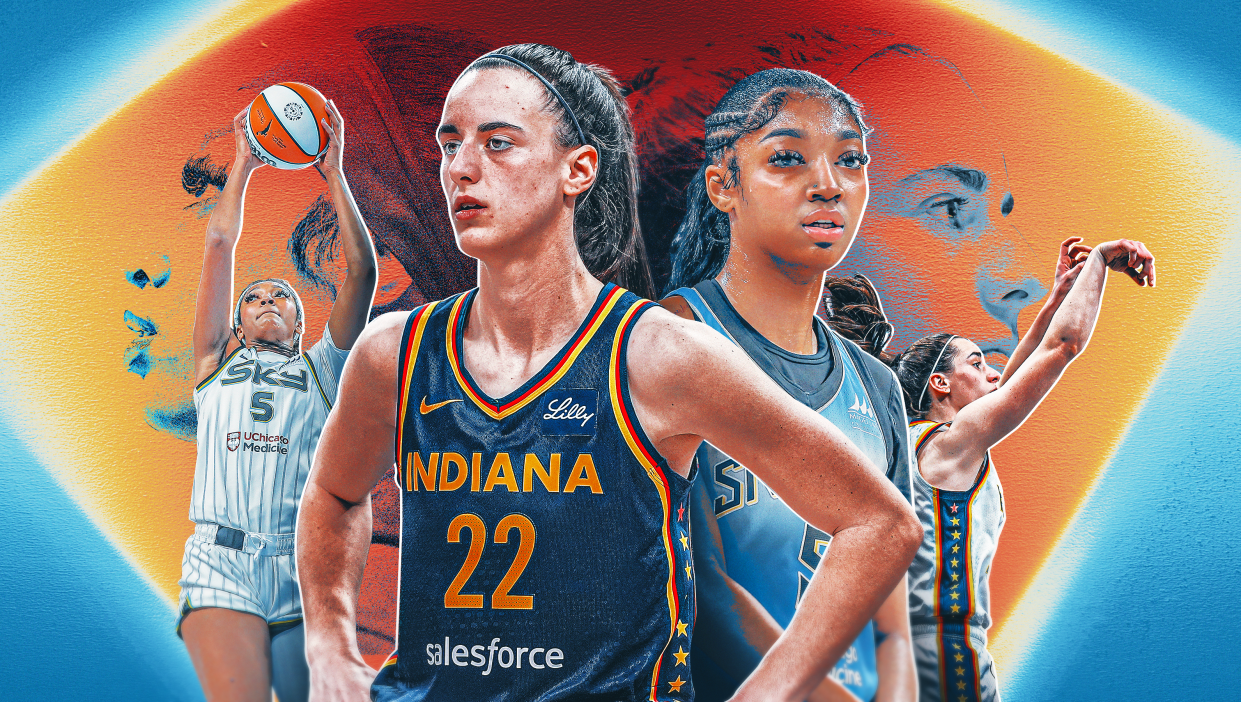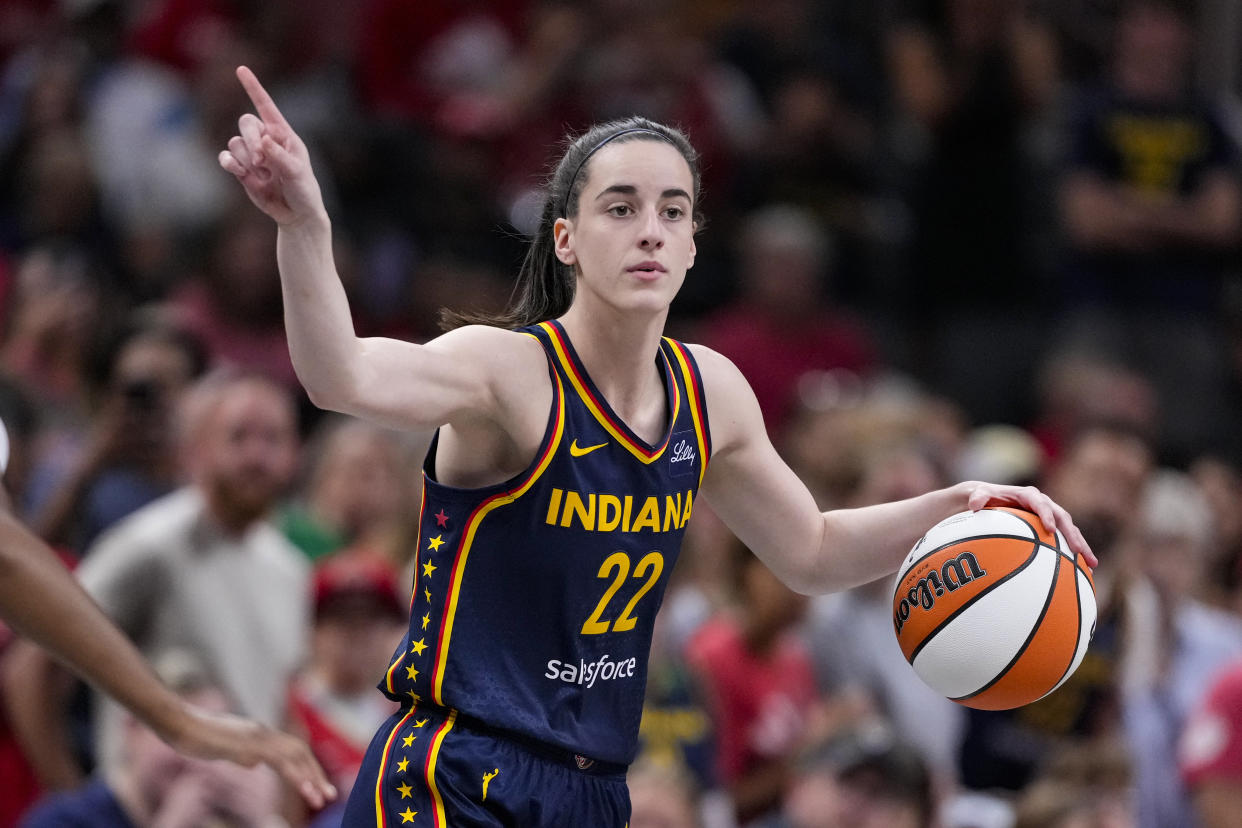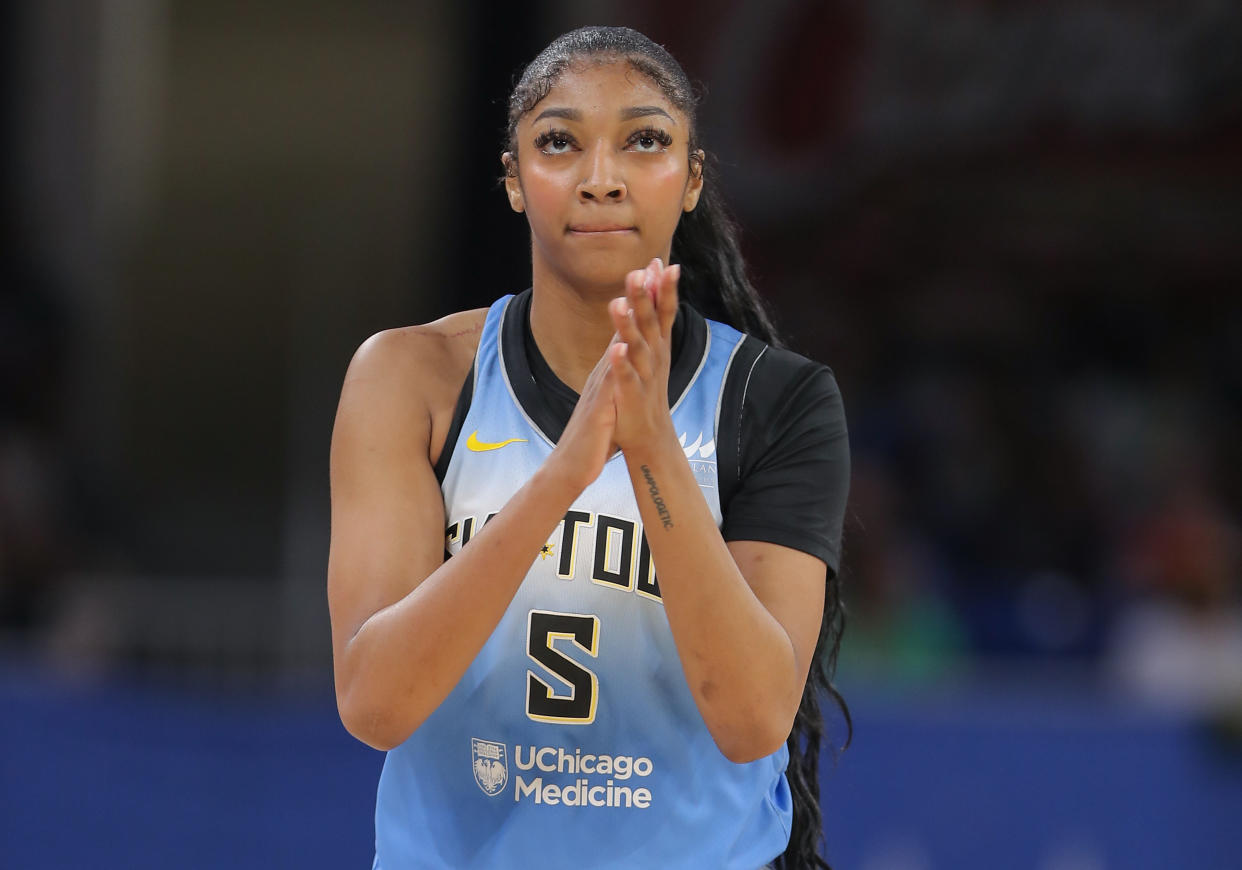Caitlin Clark vs. Angel Reese: Who has the better case for WNBA Rookie of the Year?
The WNBA Rookie of the Year race is shaping up to be one of the closest in years. Indiana Fever guard Caitlin Clark, the No. 1 overall draft pick, and Chicago Sky forward Angel Reese, the No. 7 pick, lead the debate after Cameron Brink’s season ended due to injury.
Historically, the ROY voting delivers a clear-cut winner. The last close race was in 2019 between Napheesa Collier, the Minnesota Lynx's No. 6 pick, and Arike Ogunbowale, the Dallas Wings’ No. 5 pick. Collier won with 29 of the max 43 points, while Ogunbowale pulled the rest. They have each gone on to prolific careers and participated in the 2024 All-Star game. Ogunbowale won MVP for Team WNBA and Collier played limited minutes returning from a foot injury for Team USA.
The 2015 season was also close between Seattle Storm guard Jewell Loyd (21 points) and Kiah Stokes (16), with Natalie Achonwa pulling two votes away. And 2014 featured Chiney Ogwumike (23) beating out Odyssey Sims (12), Kayla McBride (2) and Shoni Schimmel (1).
Ogwumike and Schimmel were the last rookie duo voted to an All-Star game before Clark and Reese this month. Schimmel earned MVP with a then-record 29 points along with eight assists. Back in Phoenix this year, Clark set a rookie assists record and Reese secured a double-double.
Yahoo Sports broke down the cases for and against Clark and Reese in the Rookie of the Year race, and what each can do to strengthen their candidacies.

The Case for Caitlin Clark
Clark is tasked with doing more for her team than any rookie in the class, including those veteran first-year players with time overseas. And she’s doing it well, even if it’s not to the standard fans have become accustomed to when she played in the Big Ten. The level of talent in the WNBA was never going to allow for that immediate scoring success, nor is that what the Fever need from her. Plus, she’s facing the most defensive pressure any rookie might have ever seen in league history.
The Fever needed a floor general to feed reigning Rookie of the Year Aliyah Boston and former No. 2 overall draft pick NaLyssa Smith, as well as find guards Kelsey Mitchell and Katie Lou Samuelson on the wing. And she’s done that incredibly well.
Already, she owns the franchise’s single-season assists record and secured her first career triple-double. It was the first triple-double by a rookie in the league’s 28-year history. The game before the break, she broke Courtney Vandersloot’s WNBA single-game assists record with 19.
At the All-Star game, she led Team WNBA to a strong first half and fell one assist shy of Sue Bird’s All-Star record. The rookie could have had the mark if she played more down the stretch, but Clark waved off subbing back in for Ogunbowale’s record performance.
Clark leads the league in assists, lifting the Fever from 11th in assists (18 apg) to sixth this year (20.2). Those numbers could be higher as teammates aren’t always expecting Clark’s passes, though recently players are more prepared for her behind-the-back bounces on drives to the basket. In seven of Clark’s past nine games, she’s had double-digit assists and all were double-doubles.
Her current average would break the rookie record set by legendary point guard Ticha Penicheiro (7.5 apg for Sacramento, 1998) and make her only the fourth rookie averaging at least six assists per game. Not even Sue Bird or Dawn Staley accomplished it in their first years. It would also stand as the fifth-best in league history, trailing four seasons by Vandersloot ('18-21).

Team success usually doesn’t play into a Rookie of the Year race, but it’s notable how Clark has changed this franchise within three months. The Fever are two wins away from tying their 2023 record, which was their best since 2019 (when the season was six fewer games). Three wins over the final 15 games, and the Fever will have their best record since 2016 (17-17) when Tamika Catchings was on the court. In the past month, four of their wins are against teams with .500 or better records, including league-leader New York and Commissioner’s Cup champion Minnesota. Clark was pivotal in those victories.
Among rookies, her numbers are almost unilaterally the best. She leads Reese in scoring average by nearly four points with a shooting line of 40.5/32.7/89.1. Her free-throw percentage leads the class (of those attempting at least one per game) as does her 1.5 steals per game (which is tied with Reese). She ranks fourth in blocks (0.8), double Reese’s average.
Clark has more responsibility and a trickier learning curve as a rookie point guard for a franchise mired in disappointment over the past half-decade. And even with that weight of leading the offense, she’s breaking franchise and league marks most weeks. Clark will go down as having one of the best rookie seasons in point guard history.
The case against Caitlin Clark
This is where everyone is going to yell, “But the turnovers!”
Clark leads the league in turnovers (5.6) by a large margin. Alyssa Thomas is second (3.6) with a 27.1% turnover ratio that ranks bottom-third.
Is it great? Of course not. Natasha Cloud, a nine-year veteran, is turning the ball over at a career-high rate of 3.4 times per game leading the Phoenix Mercury offense. Still, that’s two times fewer per game than Clark.
The context around the numbers is that teammates are still learning Clark’s style and high basketball IQ that put passes where most don’t attempt. But she has also been turnover prone and averaged at least 4.2 every season in college. She’s a high-risk, high-reward player and voters will determine if they feel its more risk or reward when voting.
She also hasn’t been as effective from 3-point range as she was in college. Clark is shooting 32.7% from deep, ranking 47th in the league and down from marks of near 40% as a junior and senior at Iowa.
Clark is also at a disadvantage because she’s set the standard for which she’s judged so high. She makes difficult passes look easy, and has become so synonymous with the logo 3 that when she’s not hitting them at the rate we've become accustomed to, she’s criticized as struggling.
Clark’s numbers aren’t astronomically higher than other rookies as they were against opponents in college. She’ll be dinged for that by some voters, who see Reese’s unexpected success as worthy of the best rookie award. It’s easy to lose sight of exactly what Clark is doing as a rookie in the best women’s basketball league in the world.
What Caitlin Clark needs to do in the second half
Clark’s Rookie of the Year case is already strong, but it could be lifted with less turnovers and a better shooting clip from logo land. That’s attainable with the Olympic break. Clark has been playing nonstop at an elite team-leading level since November and it’s clear her legs aren’t as fresh. She said during All-Star weekend that not picking up a basketball for a week would be good for her. Defense is a years-long process for elite guards in the WNBA, but showing progress there would help as well.
Rest and practice time with new teammates will make Clark only stronger in the now, and create a solid Rookie of the Year candidacy that will be hard to ignore. But she needs to continue to pack the stat sheet, rather than shoot only for points, as that gives Indiana the best chances at winning — and some voters have already said the race might come down to team success.
— Negley

The case for Angel Reese
Let’s start with the obvious: Double-doubles. Reese owns the record for most consecutive double-doubles with 15. Not only does that mean she’s accomplished a feat no other rookie has, it means she’s done something no one else in the league — past or present — can lay claim to. It’s impressive, especially when you consider that she passed Candace Parker to earn the accolade.
Another facet that sets Reese apart is her ability to hit the glass on offense. She’s averaging 4.7 offensive rebounds per game, which is the most in the WNBA by a wide margin. That means her team gets nearly five more possessions a game, thanks to her ability to hunt the ball. For evidence of her prowess, look no further than the All-Star game. Reese finished with 12 points and 11 rebounds against Team USA, proving her ability to score and rebound against the best players in the world. Five of those rebounds came on offense, meaning her squad got five more opportunities to score.
For Chicago, Reese is averaging 13.5 points and 12 rebounds per game. As a rebounder and defender, she leads all rookies, and her 1.5 steals per game is the 10th-best mark in the league. She’s also leading the league in total rebounds per game, grabbing more than players like A’ja Wilson, Napheesa Collier and Dearica Hamby, who have earned reputations as elite rebounders.
What Reese is doing on the glass is unprecedented, and her records put the rookie in elite company. In an 88-87 win over Indiana on June 23, Reese propelled the Sky to victory with 25 points and 16 rebounds, making her the first rookie since Wilson to have 25 points and 15 boards in a game.
The case against Angel Reese
There are two arguments against Reese when it comes to her merit as ROY. The first is her low shooting percentage, and the second is the notion that most of her offensive rebounds come on her own misses. Let’s address the shooting percentage first because it is a legitimate knock on Reese’s performance this season. She’s shooting 40.9% from 2-point range, which is in the bottom 12% of WNBA players. As a post player whose shot attempts typically come around the rim, that number is much lower than it should be. However, it is steadily rising as the season progresses. In June, Reese was shooting 34.5% from the field. In college, Reese shot 49.8% from the field, which, coupled with her ever-improving percentage as a pro, it's likely that her overall numbers will improve throughout her career. That bodes well for Reese’s career, but doesn’t mean anything for the ROY race. If she wants to take home the award, she needs to be much more efficient around the rim.
The second argument against Reese actually doesn’t have much merit. Stephen Noh of the Sporting News debunked the myth earlier this month, and calculated that even without the rebounds Reese collects on her own misses, she is still far and away the best offensive rebounder in the country. If you deduct those rebounds from her average, Reese is still grabbing 0.8 more offensive boards per game than any other player, with Ezi Magbegor coming in second.
Plus, even if all of Reese’s rebounds came on her own misses, that still doesn’t negate the fact that she’s getting the rebound. There are nine other players on the court with her, and they all want the ball as well. But Reese is the one coming up with it. That speaks to her basketball skills, motor and effort all at once.
What Angel Reese needs to do in the second half
If Reese becomes more efficient in the second half of the season, her Rookie of the Year résumé gets much stronger. The top bigs in the league, players like Wilson, Nneka Ogwumike and last season’s ROY, Aliyah Boston, are all shooting around 50% from the field. That’s the number Reese should be striving for in the second half.
Reese is a solid defender with length and quick hands, as evidenced by her 1.5 steals per game, but she could do more on the defensive end. As a 6-foot-3 forward, Reese is averaging just 0.4 blocks per game. In college she was a solid shot-blocker, averaging 1.3 per game at LSU. And who could forget the iconic video of her rejecting an opponent with one hand, while holding her shoe in the other? More of that would certainly help her case for ROY.
Chicago also needs to continue winning if Reese wants to take home the award. Typically, wins don’t matter in the ROY race. The top rookies are often drafted to losing teams, and last season Boston won the award while playing for the 13-27 Fever. But in a tight competition for the award, wins could come into play, especially since both Clark’s Fever and Reese’s Sky are fighting for playoff spots. The top eight teams earn postseason bids. Indiana is currently in seventh with an 11-15 record, and Chicago is eighth with a 10-14 record. If one rookie plays a major role in her team earning a playoff spot with a strong end to the season, that could give her a level up in the ROY race.
— Laase


